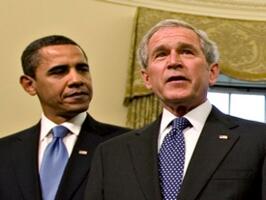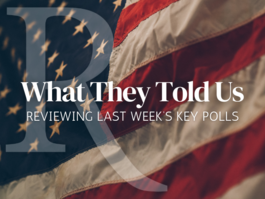What's in a Name? George W. Regrets Dubbing Those 'Bush Tax Cuts'
A Commentary By Joe Conason
When George W. Bush made his first public appearance in many months to discuss economic policy in New York on Tuesday, his utterances may have revealed more than he intended. "I wish they weren't called the 'Bush tax cuts,'" he said of the decade-old rate reductions that bear his name. But does he really believe, as he seemed to suggest, that Americans want to let those cuts expire from a desire to spite him? Or is there a deeper Bush somewhere within who would prefer not to be associated with fiscal profligacy and ideological overreach?
Whatever his motives, Bush's curious remark draws a sharp contrast with his predecessor Bill Clinton -- who often speaks proudly of the tax increase that was so central to his first budget as president two decades ago. Clinton, who talks publicly far more often than Bush, often notes that the 1993 tax increase, supported only Democrats, was the first step toward balance and growth after a dozen years of Republican irresponsibility and stagnation.
It isn't clear that Bush actually understands the indelible effects of his tax and spending policies. Someone should explain to him what is so painfully obvious when the numbers are added up: Not only should the tax cuts be named after him, so should the deficit and the debt.
The simple math is worth keeping in mind when Bush turns up to advocate maintaining the cuts he passed and legislating still more, which he claims will stimulate the private sector. "Much of the public debate is about our balance sheet ... or entitlements," he said, but the solution in his view is to focus on private sector growth. "The pie grows, the debt relative to the pie shrinks, and with fiscal discipline you can solve your deficits," said Bush at a Manhattan conference sponsored by his George W. Bush Presidential Center on "Tax Policies for 4 Percent Growth." Bush Center founding director James Glassman was present to repeat all the usual Republican bromides about incentivizing growth by cutting taxes on the wealthy, preferably to zero.
But as Clinton points out in "Back to Work," the book he published last fall, it was his tax increases on the upper brackets (along with spending cuts) that propelled the country toward fiscal balance and a vanishing debt before Bush assumed office in 2001.
"When I was president," he wrote, "we passed the 1993 budget to reduce the deficit by $500 billion, roughly half from spending cuts, half from tax increases, with only Democratic votes. The bill produced a much greater reduction in the annual deficit than experts predicted, eliminating roughly 90 percent of it even before the balanced budget bill was enacted, because it led to lower interest rates, more investment and higher growth."
The economic narrative of the Republican presidential campaign will blame increased deficits and debt on President Obama -- and argue that cutting federal budgets while reducing taxes on the wealthy will somehow restore growth. Certainly that is what Bush tried to suggest in New York when he spoke so wistfully of his endangered tax cuts. But the math undercuts him. According to the Center on Budget and Policy Priorities, Bush's tax cuts and war spending will account for nearly half of the $20 trillion in debt that will be accumulated by 2019. (That doesn't include his misconceived and costly Medicare prescription drug benefit.) The Obama stimulus and financial bailouts, including the auto revival, will be responsible for less than $2 trillion of the total debt by then, or less than 10 percent.
With due respect to the former president, public revulsion over his failed policies long ago transcended him. Those Bush tax cuts, by any other name, would smell no sweeter.
Joe Conason is the editor in chief of NationalMemo.com.
See Other Political Commentary.
See Other Commentary by Joe Conason.
Views expressed in this column are those of the author, not those of Rasmussen Reports. Comments about this content should be directed to the author or syndicate.
Rasmussen Reports is a media company specializing in the collection, publication and distribution of public opinion information.
We conduct public opinion polls on a variety of topics to inform our audience on events in the news and other topics of interest. To ensure editorial control and independence, we pay for the polls ourselves and generate revenue through the sale of subscriptions, sponsorships, and advertising. Nightly polling on politics, business and lifestyle topics provides the content to update the Rasmussen Reports web site many times each day. If it's in the news, it's in our polls. Additionally, the data drives a daily update newsletter and various media outlets across the country.
Some information, including the Rasmussen Reports daily Presidential Tracking Poll and commentaries are available for free to the general public. Subscriptions are available for $4.95 a month or 34.95 a year that provide subscribers with exclusive access to more than 20 stories per week on upcoming elections, consumer confidence, and issues that affect us all. For those who are really into the numbers, Platinum Members can review demographic crosstabs and a full history of our data.
To learn more about our methodology, click here.



